During the month of May, we reflect on the journey of Jewish people in America and their stories that have been shared on the stage. Here, we’ve curated a list of titles that tackle their experiences and transcend cultural borders.
Musicals
Goldstein: A Musical About Family; Book by Charlie Schulman, Music & Lyrics by Michael Roberts
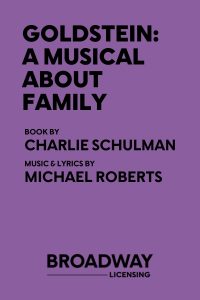
Louis Goldstein has written a tell-all family memoir. The book is a best-seller. But is it true? History becomes personal in this uplifting and heartwarming, multi-generational exploration of the challenges and triumphs of an immigrant Jewish-American family. This original musical reminds us that families are complicated, the truth is never clear, and forgiveness is our best hope.
The People in the Picture; Book & Lyrics by Iris Rainer Dart, Music by Mike Stoller and Artie Butler
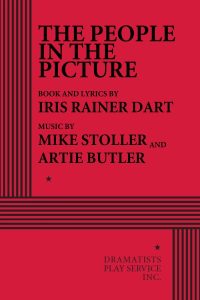
Once the creator and star of Yiddish musical films in Poland between the wars, Raisel is now a grandmother (Bubbie) in ’70s New York. Bubbie longs to tell the stories of her acting troupe’s successes and heroism to her granddaughter Jenny. Sadly, her TV-comedy-writer daughter, Red, insists on leaving the past behind, unless Bubbie will talk about the events that have plagued them both since Red’s childhood.
Plays
Alex Edelman’s Just for Us by

With a Foreword by Taffy Brodesser-Akner.
Winner of the 2024 Emmy Award for Outstanding Writing for a Variety Special for HBO’s telecast.
After following an anti-Semitic tweet aimed in his direction down an online rabbit hole, comedian Alex Edelman finds himself in an unexpected place: at a meeting of White Nationalists in Queens, face-to-face with the people behind the keyboards. What follows makes up the backbone of this show, equal parts hilarious and gripping, that made its way from small London theaters to a unanimously well-received hit run on Broadway. Within JUST FOR US, Edelman, who was awarded a Special Tony Award® for the show, explores religion, cultural identity, assimilation, empathy, gorillas that speak sign language—and what it means to be confronted with hatred.
Leopoldstadt by

Winner of the 2023 Tony Award® for Best Play
Spanning fifty years and multiple generations, Leopoldstadt follows a family’s reckoning with a past it cannot escape and a future it cannot control. A passionate drama of love and endurance beginning in the last days of 1899 through the heart of the twentieth century, Stoppard’s customary wit and beauty shines through the enduring spirit of a family tested to its most extreme limits.
My Name is Asher Lev by Aaron Posner, adapted from the novel by Chaim Potok
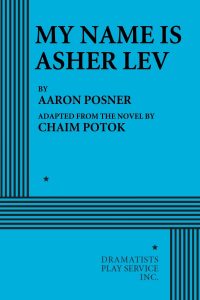
My Name is Asher Lev follows the journey of a young Jewish painter torn between his Hassidic upbringing and his desperate need to fulfill his artistic promise. When his artistic genius threatens to destroy his relationship with his parents and community, young Asher realizes he must make a difficult choice between art and faith. This stirring adaptation of a modern classic presents a heartbreaking and triumphant vision of what it means to be an artist.
TRAYF by
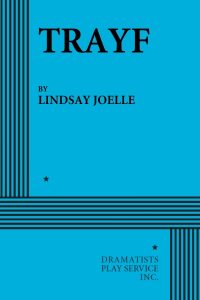
Zalmy lives a double life. By day, he drives a Chabad “Mitzvah Tank” through 1990s New York City with his best friend Shmuel. By night, he sneaks out of his orthodox community to roller skate and listen to rock and roll. But when a curious outsider offers him unfettered access to the secular world, is it worth jeopardizing everything he’s ever known? This road trip bromance is a funny and heartwarming ode to the turbulence of youth, the universal suspicion that we don’t quite fit in, and the faith and friends that see us through.
If I Forget by
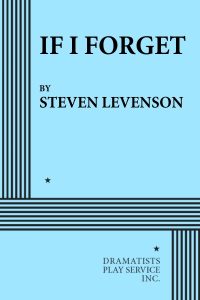
In the final months before 9/11, liberal Jewish studies professor Michael Fischer has reunited with his two sisters to celebrate their father’s seventy-fifth birthday. Each deeply invested in their own version of family history, the siblings clash over everything from Michael’s controversial scholarly work to the mounting pressures of caring for an ailing parent. As destructive secrets and long-held resentments bubble to the surface, the three negotiate—with biting humor and razor-sharp insight—how much of the past they’re willing to sacrifice for a chance at a new beginning. If I Forget tells a powerful tale of a family and a culture at odds with itself.
The Wanderers by

Two marriages have seemingly little in common: Esther and Schmuli are Orthodox Jews navigating strictly defined rules and roles, while Sophie and Abe are secular and free to make their own choices. But both couples are growing apart as they strive to balance their individual identities with the families they’ve created. As Esther tests the boundaries of her personal freedom, Abe falls into a correspondence with a movie star that will shake the foundations of his marriage and career. Anna Ziegler’s funny, moving, and thoughtful play asks if following one’s truth is worth it, no matter the cost.
Included in Broadway Book Club’s College Theatre Pack
Wicked Child by
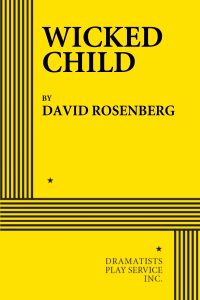
Jake brings his new girlfriend, Amelia, to his close-knit, blended family’s Passover Seder. Despite being a fish out of water, Amelia makes a great impression on the family, though she’s thrown off guard by the tonal discrepancy between the family’s joy and the Passover story—which plants a seed of doubt in Jake’s mind. But the real disruption to the holiday is the news that Jake’s stepbrother, Ben, is quitting his lucrative consulting job and moving to Israel. At the following year’s Seder, everyone in the secular family has come to terms with the news, except Jake, whose disagreement with his stepbrother’s choices are threatening to make him a pariah in his own family. Will the family be able to survive beyond the Seder?
The Model Apartment by
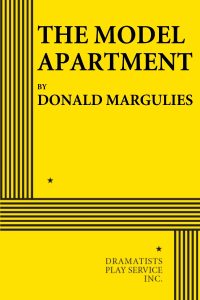
A brilliant and bizarre black comedy about a pair of elderly Holocaust survivors and their outlandish, deranged daughter, which, in a series of sometimes hilarious, sometimes moving scenes, traces the pervasive, baleful effect of their earlier trauma on the “better life” they have tried to build. Having retired to Florida, Max and Lola are dismayed to find that their new condo is not yet ready for occupancy and that they are obliged to stay temporarily in a “model apartment” —a tacky, gaudily decorated horror with a fake television set and refrigerator where even the ashtrays are cemented in place. Max and Lola had hoped to escape not only the nagging memories of their earlier lives, and the terrors of present-day Brooklyn, but also their fat, schizophrenic daughter, Debby, whom they had tried to “pay off” with generous amounts of cash before their hasty departure. But Debby, who seems to symbolize for them the awfulness of their past and their failures in the present, soon appears, followed in short order by her boyfriend, Neil, a slightly retarded black teenager whose limited sensibilities have been further numbed by the grinding horrors of the urban ghetto. Sometimes moving (as when Max, dreaming, imagines Debby as the lovely, innocent daughter he lost to the Nazis) or darkly comic (as when Max and Lola gingerly query Neil about how he and their daughter first met), the many short scenes coalesce into an affecting, ultimately disquieting whole, which makes it chillingly evident that those who are unable to confront and overcome the demons of their past are doomed to be forever haunted by them.
Coney Island Christmas by Donald Margulies, based on the story “The Loudest Voice” by Grace Paley
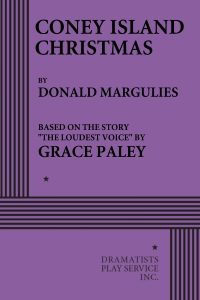
Pulitzer Prize-winner Donald Margulies weaves together nostalgia, music and merriment in this new seasonal classic. A holiday show for people of all ages and all faiths, Coney Island Christmas introduces us to Shirley Abramowitz, a young Jewish girl who (much to her immigrant parents’ exasperation) is cast as Jesus in the school’s Christmas pageant. As Shirley, now much older, recounts the memorable story to her great-granddaughter, the play captures a timeless and universal tale of what it means to be an American during the holidays.
Eight Nights by
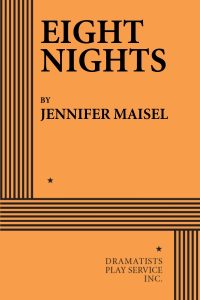
Eight Nights follows Holocaust survivor Rebecca Blum and her family as they grow and evolve as Americans over the course of eight decades. In their Lower East Side apartment, Rebecca, her father, future husband, daughter, and more, celebrate each night of Chanukah, the festival of lights. They discuss marriage, friendship, parenthood, immigration, and especially, memory. With each passing year, Rebecca’s continued perseverance inspires her family, ensuring her legacy stretches well beyond the walls of her apartment.
The Last Seder by
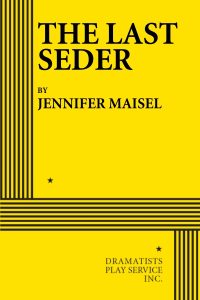
The Price family has gathered for one last Seder. Matriarch Lily has been taking care of her Alzheimer’s-stricken husband, Marvin, for years, but the family has decided it’s best for all involved parties to move him into an assisted-living facility. Lily and Marvin’s four daughters and their plus-ones—ranging from brand-new to longtime partners—all arrive at the girls’ childhood home to help with the transition and instead end up fighting, divvying up keepsakes, and reliving memories. The Prices, who are always ready for a laugh or a cry, must face a bittersweet future as their family changes for good.
Susie Sits Shiva by
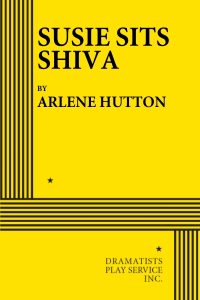
A high school student deals with the death of her biology class lab partner through a religious ritual about which she knows nothing. Family, friends, and social media collide and connect in Susie’s living room as she learns to mourn (and to sit) while honoring the memory of her friend and his culture. Commissioned by the Educational Theatre Association, SUSIE SITS SHIVA is a heartfelt reflection on life after unthinkable loss.
Theda Bara and the Frontier Rabbi by Bob Johnston and Jeff Hochhauser

Back in the days before Madonna, Marilyn and even Jean Harlow, there was Theda Bara! She was the Vamp. In the year 1917, if a newly ordained rabbi named Isaac Birnbaum were to be spotted by a member of his congregation watching this creature drive a priest to bottle and suicide in a steamy silent film called Father, I Have Sinned!, he’d have to think fast to come up with an explanation. Truth to tell, the rabbi finds Theda Bara far more exotic than his old favorite, Tom Mix. But if he were to tell the truth, chances are he would be assigned to assessing the probity of pickles in a Brooklyn factory rather than realizing his vision of remaining in Hollywood as the Frontier Rabbi. Theda Bara has problems too. Instead of being an enigmatic import from Egypt who can speak no English and must communicate through her conniving producer Selwyn Farp, she is, in fact, none other than Theodosia Goodman, a nice Jewish girl from Cincinnati. And what is her dream? Not to drive men gaga by mouthing, “Kiss me, my fool,” but to put on a pretty dress and pearls, go to synagogue and meet a nice rabbi. While Isaac’s sister is fixing to make the introduction, Isaac is readying a sermon of denunciation, and Theda is preparing to pick grapes from her heaving bosom in a new movie of Cleopatra. As for Selwyn Farp, he is plotting to install the wavering rabbi as the puppet head of the movie industry’s watchdog, the National Board of Review.
Modern Orthodox by
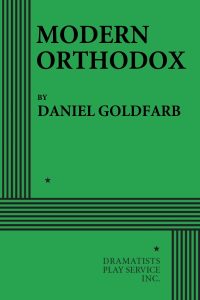
In a Manhattan coffee shop, Ben, an Upper West Side financial consultant, meets Hershel, an Orthodox jewel merchant, to buy an engagement ring. Although both men are Jewish, it is their shared religion that instantly divides them. Tension mounts in the midst of the deal when Ben suggests Hershel remove his yarmulke. Desperate to make the sale, Hershel obliges. In the apartment they share, Ben proposes to his girlfriend, Hannah, a sensitive yet stong-minded doctor. Hannah accepts, but the moment is muddled by mixed emotions for each of them and the sudden and unexpected arrival of Hershel on their doorstep! Frantic and frenzied, Hershel recounts that since he removed his yarmulke, his life has fallen apart. Hershel moves in with Ben and Hannah and they begin the task of putting his life back together—by finding him a bride. A modern couple, they turn to the Internet for matchmaker. On Shabbat, Hannah arrives home from a long day at the hospital, upset. Although Hershel has never been alone with a woman before, he offers Hannah comfort and support, which leads to a kiss. Hershel goes out on his first date with Rachel, the online suitor. As Hershel discovers his love for Rachel, Ben and Hannah rediscover their love. Three months later, Ben and Hershel meet again, as changed men, no longer divided by their faith. They have learned something from each other, and each couple is ready to embark on married life; one beginning as Orthodox virgins, the other as modern parents-to-be.





